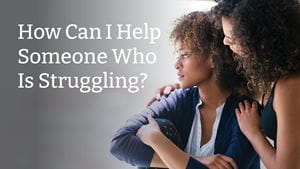
Many of us have at least one person in our lives who deals with anxiety or depression on a daily basis. More than 17 million adults in the U.S. are experiencing depression, according to data from the National Institute of Mental Health.
Garry Spink, PhD, a psychologist with Rochester Regional Health, outlines the mindset that people should have when approaching someone who may be depressed or anxious and in need of help.
The first thing to keep in mind about people experiencing anxiety or depression is that no two people will experience it or show it in the same way. Some people are very open about what they are dealing with, while others may want to hide it.
If you do start to notice that someone is acting differently by not interacting as often with their friends, not showing up for family functions, or taking days off of work, that could be an outward signal that they may not be doing well.
“It’s very normal to have instances where you’re anxious and very normal for people to be sad sometimes and depressed,” Dr. Spink said. “There’s events that happened to all of us that create those symptoms or moods.”
When you see that behavior with a family member or close friend, Dr. Spink said it is always okay to check in.
“If you notice somebody’s not around, shoot them a message, give them a call,” Dr. Spink said. “Just say, ‘Hey, I noticed you haven’t been to the past two get togethers. Just figured I’d give you a call, see how things are going, see if everything is okay.’”
If you are coming from a place of being curious and concerned, that can be a helpful place for both of you. In that conversation, acknowledge their choice and autonomy to make their own decisions, but make sure the person knows they are cared for.
While you cannot control what someone is doing, you can suggest talking with someone else. That could be a doctor or their primary care provider, but also a pastor, spiritual advisor, or a close family member.
In some instances, a person might escalate their behavior to the point of threatening harming themselves or another person. If anyone’s immediate safety is in question, call 211 or 911.
When you make that choice to call for assistance, be sure to tell them that you are going to make that call.
Part of that decision-making process is figuring out which is more important for you: Maintaining the relationship with this person or them being alive. It is not an easy decision to make, but you may need to make it.
People who need to see a doctor or medical provider have several places to go.
The emergency department at any Rochester Regional Health hospital is available as a resource to any member of the community.
The Behavior Health Access & Crisis Center at St. Mary’s Medical Campus is also open 7 days a week; visitors can call (585) 368-3950 to check in. There, they can speak with a therapist almost immediately, as well as get hooked up with an outpatient setting that could help with their concerns.
There is also a centralized intake number – (585) 922-9900 – which allows you to schedule appointments at any clinic through Rochester Regional Health. At that first appointment, you will meet with a therapist who will discuss your concerns.